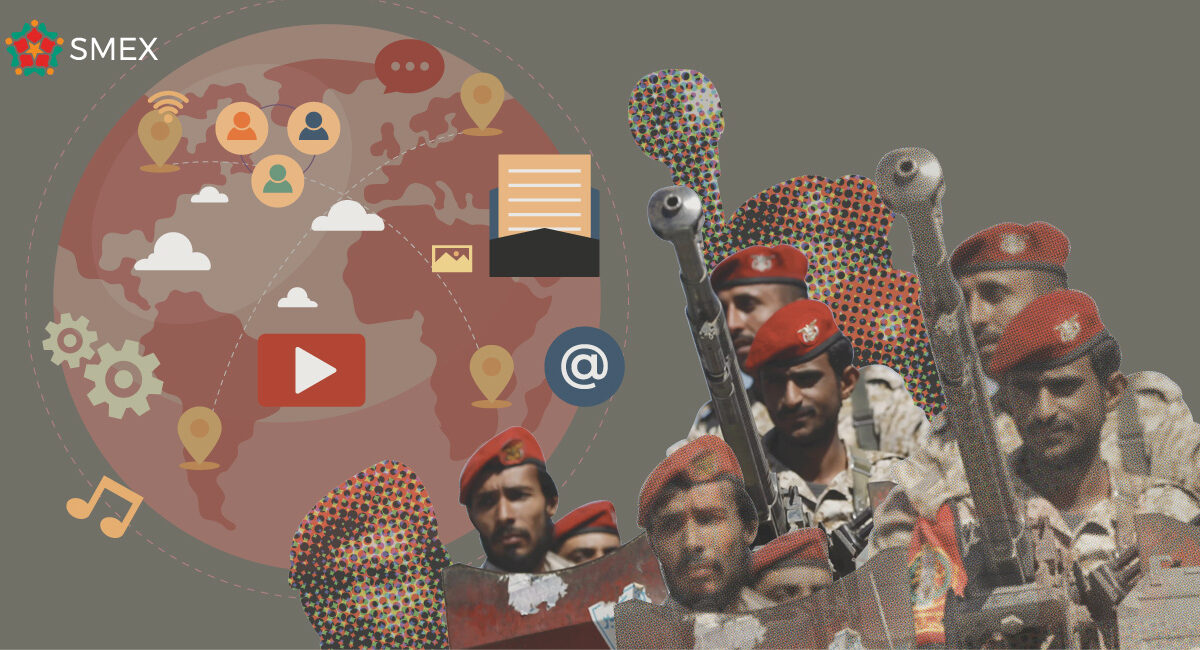On July 18, 2023, YouTube terminated around 20 Houthi-affiliated channels for “violating YouTube’s community guidelines.” In response to these restrictions, Houthi groups launched social media campaigns calling for the Ministry of Telecommunications to ban YouTube and Facebook.
In an interview with SMEX, a source who preferred to remain anonymous revealed that Houthis often mobilize their online groups to post on Twitter using a specific hashtag before important events, especially events with direct implications for citizens. This practice helps Houthis gain popular support and justify their decisions and actions.
On August 5, 2023, Houthi groups launched a propaganda campaign to ban YouTube and Facebook, according to data monitored by SMEX through the Cloudflare Radar. The data exposed programmed bot internet activity in Yemen at the exact hour of launching the hashtag #الحظر_بالحظر (a ban for a ban).
On August 6, the Houthis held an expanded meeting for its Union of Journalists and issued a statement urging the Attorney General in Sana’a and the Ministry of Telecommunications to ban YouTube and Facebook because they “threaten Yemen’s national security.” Such a decision, however, is yet to be implemented.
These demands violate the Yemeni Constitution, of which Article 42 stipulates that “every citizen has the right to participate in the country’s political, economic, and cultural life of the country. The state shall guarantee freedom of thought and expression of opinion in speech, writing, and photography within the limits of the law.”
Article 53 of the Constitution also emphasizes the state’s duty to “guarantee the freedom and confidentiality of mail, telephone, telegram and all other means of communication, none of which may be censored, searched, exposed, delayed or confiscated except in cases specified by law and according to a court order.”
On August 9, three days after the statement was issued, internet users in Yemen began facing difficulties in accessing YouTube, and some features, such as comments, were disabled for hours before being restored.
SMEX also received messages from users in Yemen detailing that the Houthi-controlled YemenNet, the only internet service provider in Yemen, restricted content by applying DNS restrictions. The images below demonstrate these restrictions.
Along the same lines, another source who asked to remain anonymous informed SMEX that in 2020 the Houthis established digital committees known as the “Electronic Brigades” (Al-Kata’eb Al-Electroniyya) after Twitter deleted a number of fake accounts.
According to our source, the Brigades recruited people from Houthi-controlled regions and paid them 100,000 Yemeni Riyals (equivalent to USD 200) per month for managing 15 to 20 fake accounts and running social media campaigns.
Digital Censorship and Oppression
On March 26, 2015, on day two of the Yemeni War, the Houthis blocked websites belonging to Yemeni, regional, and international press that oppose Houthi policy, such as Reuters, Agence France-Presse, Al-Jazeera, Al-Arabiya, BBC, and the Washington Post, which remain banned in Yemen until today.
This ban was imposed by the Ministry of Telecommunications and the Public Telecommunications Corporation, which took control of the press during a military rebellion in cooperation with former Yemeni President Ali Abdullah Saleh, eventually overthrowing the regime at the time.
Since then, the number of blocked websites and media outlets has been increasing, reaching 208 websites between March 2015 and December 2022, according to a screening conducted by SMEX and reports by Access Now, which ranked Yemen among the countries with the highest number of internet shutdowns in the region.
Writer and social researcher Hamdan Aly told SMEX that “social media has become the only resort for citizens and has contributed to uncovering several political crimes and criminal offenses to the public.” Aly explained that the Houthis opted to restrict citizens’ freedom of expression in online spaces despite the benefits gained from social media.
Bankruptcy and Misinformation
Mohammad Al-Eryani, Minister of Information and Culture and Minister of Tourism in the Saudi-backed government, boasted in a tweet that YouTube and Facebook agreed to his demands to terminate Houthi channels. However, a source from the Ministry confirmed to SMEX that these claims are inaccurate.
According to our source, the Yemeni government had no part in account terminations, which contradicts the statements of the Minister of Information. The minister shared another tweet on the same day celebrating the termination of Houthi accounts for violating YouTube guidelines by promoting terrorism and violence.
“The accounts were terminated because they promote violence, call for armed mobilization in cyberspace, and post videos and war songs (zawamil). This led to hundreds of channels belonging to Houthis and others to be taken down,” the source added.
Technical Capabilities Needed to Implement the Ban
To ban websites and limit user access to the internet in Yemen, Houthis, according to Fahmi Al Baheth, an expert in Cybersecurity, use the Canadian web filtering platform Netsweeper, which offers a system to filter and classify web content.
The Yemeni Ministry of Telecommunications bought Netsweeper services in 2010. It began using it to restrict user access to websites that provide specific types of content, such as pornography sites and certain news websites, days before the start of the 2011 revolution.
Al Baheth explained to SMEX how Netsweeper relies on rules and criteria to determine if the content is wanted and whether to restrict websites and pages users try to access. The platform screens content and compares it with a database of filtering rules (websites to be blocked). Access is prohibited in case of a match, and the user gets an error message that the content is restricted. The same applies to applications.
“This filtering platform was originally meant to be a parent supervision tool to monitor child activity. It is supposed to be used by schools or universities, for example, and not be applied to all internet users in the country,” said Baheth.
A report by the University of Toronto’s Citizen Lab confirms Baheth’s perspective and accuses Netsweeper of violating the International Covenant on Civil and Political Rights (ICCPR) and facilitating the activities of a rebel group targeted by UN sanctions.
Furthermore, Houthis blocked VPN websites such as Tor and Psiphon and other secure applications utilized by journalists, activists, and human rights defenders. Still, they maintained access to non-secure apps that provide the same VPN services.
A Long History of Oppression
Houthis hold a long record of practices restricting communication freedoms by continuously censoring websites and platforms without clear justifications. They have previously banned WhatsApp, Facebook, Twitter, and Telegram, especially in times of crisis, such as the events of December 2017, which led to the death of former President Abdullah Saleh.
In 2019, Instagram was blocked in Yemen for several days. In late October 2022, Google Meet and Zoom were restricted despite being used by the government and the Yemeni Presidential Council to hold weekly meetings. This restriction led to widespread rage, and the Houthis were forced to lift the ban after a few days.
This quasi-regular pattern, adopted by the Houthis and the Saudi coalition-backed government, proves that internet bans in Yemen are a means to exert pressure to achieve political and military gains. The events of July 2018 are a case in point, as the Houthis cut off internet and communication services in Hodeida for approximately a month and a half, slicing through fiber optic cables while Yemeni military forces advanced toward the governorate.



